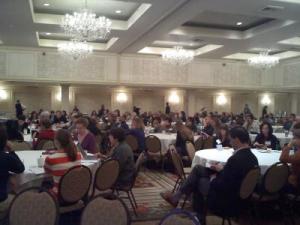Annie Paul, author of Origins: How the Nine Months Before Birth Shape the Rest of Our Lives, did not take the usual, ho-hum road to pen her book. “I went to extreme measures,” she jokes. “I got pregnant.”
Although all of the panelists at “Great science writing part I: From eureka moment to book”, had their own adventures culminating in the birth of their own books, Paul’s was certainly the most creative. But thankfully, there are others ways to find inspiration and produce a worthy technology-driven tome, as shared by the speakers.
Maryn McKenna knew she had publishing gold when, after writing a freelance piece about MRSA and women for Self Magazine, “my email inbox exploded…and the story was picked up by The Today Show and Montel,” she recalls. “People wanted to know what the next dimension of the story was,” and thus a book proposal was conceived. Her book, Superbug: The Fatal Menace of MRSA, was published in 2010.
McKenna used a blog to organize her thoughts for her project, which is a great idea, echoed Brain Switek. His dinosaur-infused work, Written in Stone: Evolution, the Fossil Record, and Our Place in Nature” was also published this year. He described how he spent three years researching the field in order to gain the background necessary to write his book. During that time, he blogged every day. “A blog is a writing laboratory,” he stated, quoting another writer.
When you choose your subject, make certain you love it, because it will consume you for huge swaths of time. “[Writing] magazine articles [is] like dating someone, and writing a book is like marrying a person,” remarked Douglas Starr, author of “The Killer of Little Shepherds”. “If you pick the right person, it will be endlessly absorbing and it is the same thing with your book topic.”


